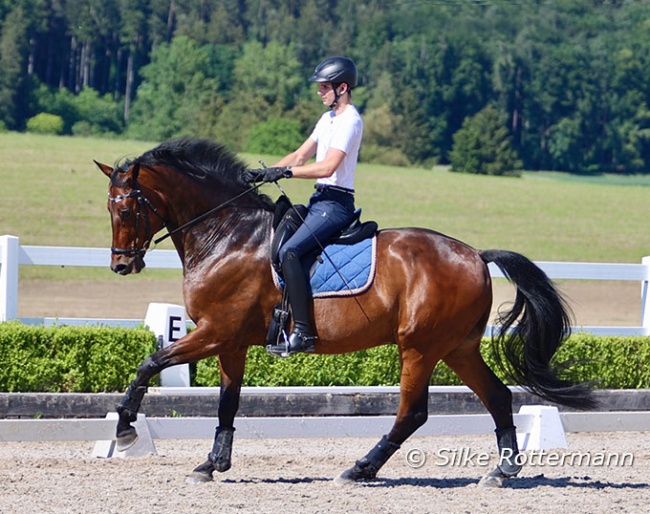
- Text and Photos © Silke Rottermann for Eurodressage
The 2024 CPEDI Mannheim at the beginning of May is always a good opportunity to meet para riders and dig a bit deeper into their personal story, equestrian views, and goals for the upcoming season. After my interviews with Roberta Sheffield during the 2022 and Julia Sciancalepore during the 2023 edition of the Maimarkt Show, I caught up with German Noah Kuhlmann for the 2024 para interview right before the vet-check on Friday afternoon, 3 May 2024.
Only 21 years of age Noah, who lives near Lake Constance, is the German team’s benjamin. A successful pony rider in his childhood and teenage days, he turned a devastating diagnosis into something positive to embark on the international para scene just two years before with his 14-year-old Rhinelander gelding Staatslegende (by the Stedinger son Statesman out of a Lanciano mare) and is on a rise ever since.
How did you get to horses?
My mother has always ridden and I accompanied her to the stables since I was a toddler. The first photo of me on a horse was taken when I was 8 months old. When I was about 5 I really wanted to start riding, but it was hard finding a riding club in the south of Germany which accepted me at that young age. Instead all recommended me to do vaulting which I didn’t want to do, but finally we found a club and I took the usual lessons, first at the lunge and then on school horses.
For young people at some point the love for horses becomes an ambition to compete. Was it the same for you?
My mother was a dressage rider herself, but I also like the lightness and ease. In dressage it is the art that you are able to do difficult things with your horse, but ideally the onlooker doesn’t see how you do it. That aspired me to try it myself.
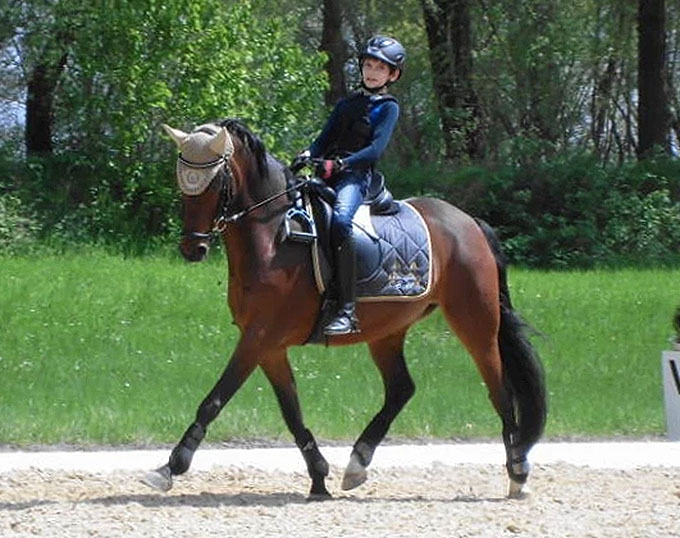
However to compete in higher classes I needed a different kind of pony with more natural go and my parents bought me a German Riding Pony, Top Nemo, from Cornelia Endres (the German pony team trainer at the time) and we were really a match. With Nemo I went up the classes until elementary level and I competed FEI pon classes as well. Unfortunately he was repeatedly plagued by tendon troubles, but my parents leased a pony for the time until Nemo was fit again.
When I moved to a boarding school in Bavaria, my pony moved with me and was stabled with the Bavarian federal pony coach Danica Langenstein. It was quite an effort when she moved farther away and I had to be driven there from boarding school as public transport was not possible. Still all went really well, I qualified for the Southwest German championships, but Nemo got soundness troubles again, which unfortunately were the beginning of his retirement.
Such setbacks at teenage age would set many riders off, but not you?
No, I love horses and I like to contest. But admittedly I was also lucky that when Nemo had his off times my parents leased me a pony so that I could continue my riding education and continue competing. However, with the bigger distance between boarding school and Danica Langenstein, I decided to change to a trainer closer to my school who was Robert Harrison Schmerglatt, an Australian Grand Prix rider who today lives again in Australia. There fate struck in a positive way as I found my heart horse.
You talk of Staatslegende, the horse you embarked on the German para scene just a few years ago?
Exactly. Anna-Katharina Gerber had three horses at Schmerglatt and as she was busy studying law at that time, she had to part with one. Although Johnny Hilberath advised her to keep the young one of these three, that horse was exactly the one she sold.
And we were lucky she sold Staatslegende to us. Because even as a child and teenager and unaware of my illness I always had trouble with my legs’ strength. I couldn’t ride horses well which needed pushing or needed to be ridden with strength.
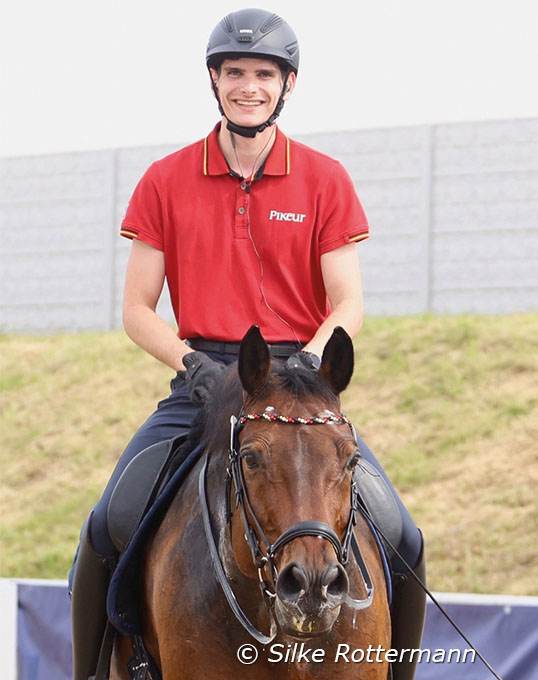
I knew San from the stable and I knew he can become a bit difficult at times, but I loved this horse. He was so beautiful and expressive. I just thought he is a great horse. Shortly before Christmas when he was 5 years we bought him. The funny thing about the purchase is that my father had no clue that he had just bought the crazy horse he had sometimes seen in the indoor. He only got to know it years later. He would’ve never bought him otherwise (laughs).
Nine years ago you were still a child and came from ponies. How did that work out with such a rather difficult horse?
The beginning was rather difficult indeed and all his four hooves were regularly up in the air…but he never got me off at that time, we persevered and it slowly went into the right direction.
When Robert Schmerglatt relocated back to Australia, I also left boarding school and moved back to my home near Lake Constance. This meant I was in need of a new trainer who could competently help me with San and who fits and understands my horse’s nature. By chance we found Tiggy Lenherr in Switzerland as my father daily passed by her stable on his way to work.
Tiggy was a bit hesitant first because her approach is to develop horse and rider together, but once she was convinced this is also our approach, we could move into the Lenherr Sport Horses Stable in Pfyn in Switzerland which is about 30 minutes from where I live in Germany. This is now seven years ago and we have never been so content with training and horse keeping like in this stable.
In what way did San develop during these seven years?
San’s training worked out well from the beginning. He muscled up, he developed and got the complete program, from aqua trainer to osteopath on top of the regular dressage training.
It was not only San, but likewise me who thrived under Tiggy’s tutelage. I was able to put her advice into practice.
Then came Corona and about two weeks prior to it we came the point in the time when I literally turned a para rider. One morning after taking a shower before school I fell. Out of the blue I had no feeling in my legs anymore. Naturally I stayed home instead of going to school on that day, but I did not worry too much and thought it will surely soon come right again.
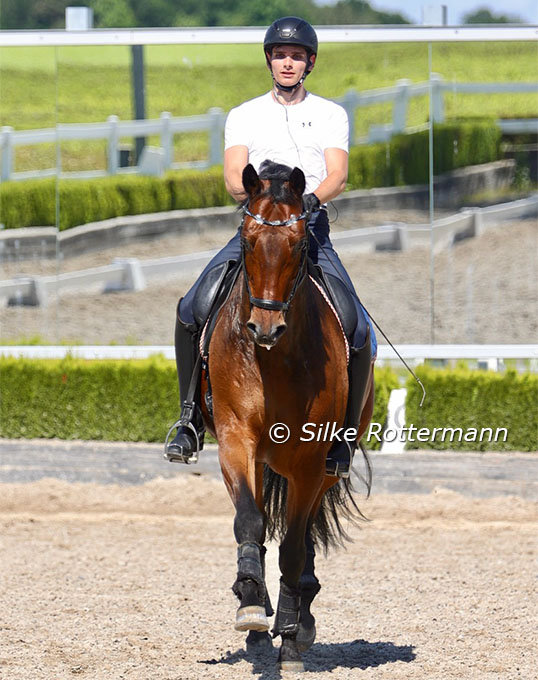
When I finally got home I could go from A to B in our house, but I did not walk like I do again today and I had to focus hard. Talking and walking at the same time was an impossibility at the beginning. During some blood checks at the university hospital they finally found out that a genetic defect caused my symptoms. It is called "familial spinal paralysis" and in my case it affects the long neural pathways, which means my feet, legs and a bit my hands also. It is rare illness which is not yet that explored by science.
It is a progressive illness, but is there something which can be done to slow it down?
It is a progressive illness, but the progressions are very different. It is recommended to do a lot of sports and live healthily to slow it down. But there is no secret to do this and that and it works then. As it is so badly researched it does not matter where I am, if at the doctor or at the physiotherapy, they all do not know it very thoroughly. That means I have to tell them how I am and where my problems are, what I can do well and what helps. That way the therapist and I come together which works out well when I have my physio sessions twice per week.
What did that diagnosis mean for your riding and how did San’s training continue in Corona times when the border to Switzerland was closed for some time?
The border was closed for a long time. During this time Tiggy looked after San and his training in an excellent way. She also regularly reported about him and his progress so we had our minds at rest that San was well. We are really grateful to the Lenherr family that they looked so well after our horse and we did not need to worry.
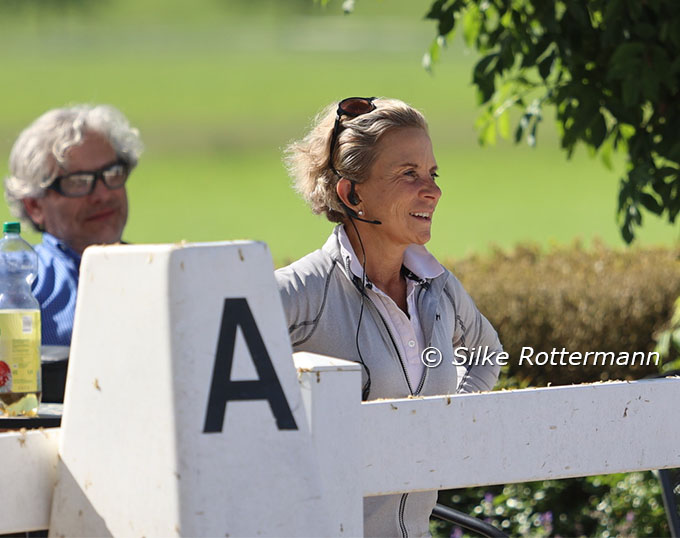
long-time trainer
At the beginning I first had to come back as a rider in the truest sense of the word. I was far away from riding five times per week like I did before my diagnosis and like I do it now again. Lessons also did not make sense at that time. I began with riding once per week and slowly increased it. After it became clear that riding worked for me, Tiggy told me we should start lessons again and see how it goes.
We both had to adjust to the new situation because when Tiggy, for example, told me to give a bit more pressure with my left leg I did not know how much is a little bit because I hardly had any feeling in my legs. So sometimes I acted too little, sometimes too much, but she would let me know and San of course also. But now we are a „winning team“ in that Tiggy knows how she has to communicate these things to me and I know how to put it into practice.
When did the idea arise to join the para dressage family?
Actually it was my father’s idea first. After I had regularly ridden and having had lessons again, he approached Tiggy and she told him he should look after that and as long as I can move my thighs all would come well (laughs). At that time I couldn’t really do it, but we still followed the idea. It was turning my illness into something which gave me a new goal and a challenge.
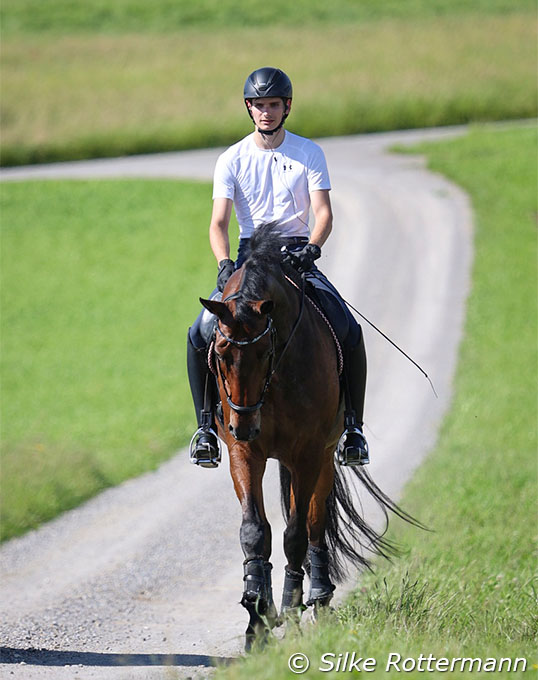
So after having been graded nationally, I was allowed to take part in a para-dressage clinic in Ansbach in October with Uta Härlein. She was content with me and passed me on to our co national coach Rolf Grebe who assessed me and San in February 2022 during a clinic in Berlin. I still feel I absolutely did not present us to the best of our abilities back then, but Rolf seemed content and invited us to the national squad clinics and said I should enter for Mannheim 2022 and be internationally graded there. This was our international debut and it worked pretty well. I was invited to take part in the German championships in Munich afterwards.
Well, then we got into the flow and a year after we already won the freestyle at Mannheim.
You have competed in FEI classes in the able bodied pony division and now in para-dressage. Do judges want to see the same in both?
Well, they want to see elevation, active hind-legs and impulsion and precise riding, but in para-sport only the horse is assessed and marked. For that reason the judges are way stricter about how the horse is moving: Is the horse behind the vertical or not? Does the impulsion come from behind? Does the horse express contentment or not?
This is sometimes still different in the able bodied sport where perhaps when the horse is behind the vertical, but he still gets high marks because he looks well otherwise or shows the movement nicely. A horse behind the vertical should still get a reduction in the marks and I feel this is simply stricter in para-dressage.
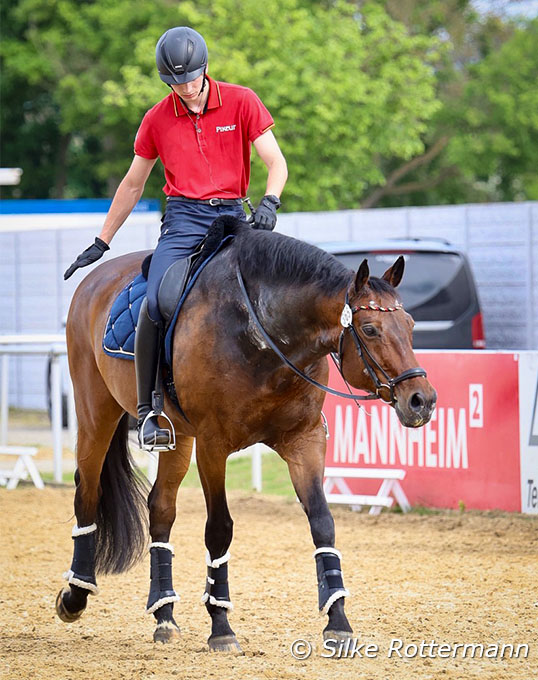
para dressage
Apart from the quality and precision, it is paramount in para dressage how content the horse is. For example if the horse swooshes its tail all the time, but otherwise does a nice program, it is not really relevant in the able bodied dressage, but in para dressage it is because it shows that the horse does not make a content impression. The happiness of the horse is a very essential criteria in para-dressage.
And for that reason, if we look at the the recent discussions about horse welfare in equestrian sport, in my very personal opinion the para-dressage sport is on a better way than the one of the able bodied.
Do you still compete in able-bodied competitions as well?
We try to include it the best we can, but with all the national squad clinics and international para shows the calendar is really crowded over the summer months when also the able bodied shows usually take place.
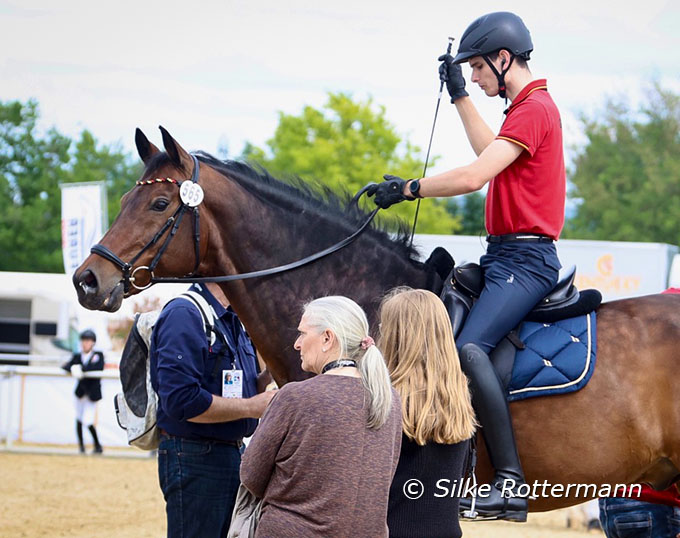
Are the Paralympics a long-term goal for you?
It is certainly a goal, but Paris is too early. I am now two years in international para-dressage. It is my goal to get on the long-list for Paris and into our national para group 1. At the moment I am in group 2 which is the talented squad, but group 1 next year is a goal.
We have too many strong riders at the moment in Germany to have a realistic chance to get to Paris this year. You have to know that there was a huge step in Germany in these past two years. Everybody has the necessary ambition and pushes one another, so everybody also progressed which is nice, but makes it even harder to get a team spot.
We all know that equestrian sport is not a cheap sport. Is there any interest of sponsors in para dressage?
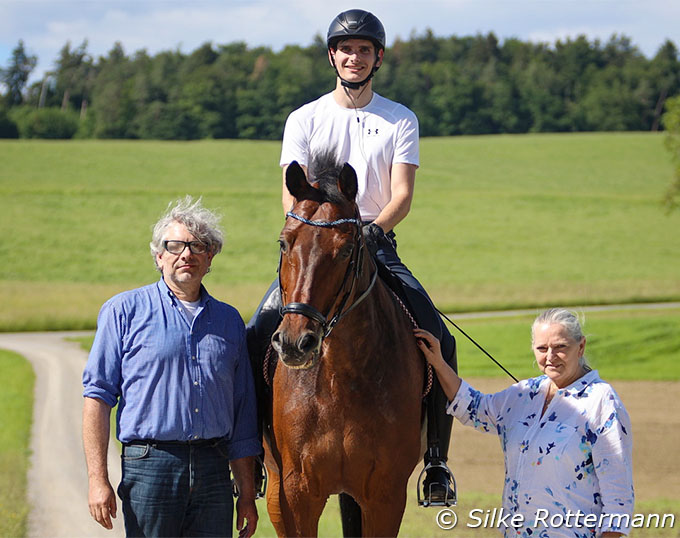
one day before they departed to the CPEDI Stadl Paura
In Mannheim it is exemplary that the para-classes are mixed with the CDI ones or run parallel to the jumping nations cup. Usually there are only pure para shows and if then big magazines are not present. Para dressage gets easily lost and visibility is not very big.
Of course I would like to have more sponsors, but my main sponsors have been and still are my parents (laughs). They are also fully involved and with me at every single show. Papa is my groom and accompanies me daily going to the stables. It is great fun for all of us.
- Text and Photos © Silke Rottermann for Eurodressage
Related Links
2024 CPEDI Mannheim: The Heat Was on in Grade III to V
Photo Report: A Sunny Training and Jog Day at the 2024 CPEDI Mannheim
2023 CPEDI Mannheim Welcomes Spring and Top Para Dressage Sport
Finalists Announced for 2016 German Developing Pony Rider Championship